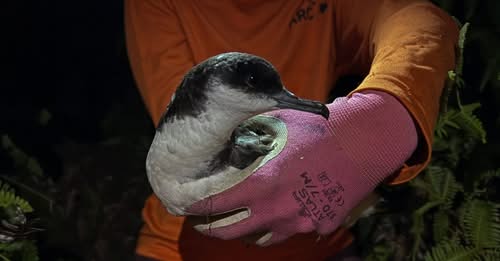
A downed Newell’s Shearwater gets rescued, photograph from Archipelago Research and Conservation
Night-time football games will be allowed once more on the Hawaiian island of Kauai during the fledging season of the Critically Endangered Newell’s Shearwater, Puffinus newelli from 15 September to 15 December, following the previous season when no night games took place.
“During these months, the young nocturnal birds leave their mountain burrows for the first time, journeying to the sea and guided by the stars or moonlight. Artificial lighting from stadiums, as well as homes, streetlamps and vehicles can disorient them, causing them to crash to the ground.”
Some night football games on Kauai will be allowed, following a tiered system to classify bird fallout risk as low, medium, or high. Four of the seven games scheduled during the current fledgling season can be played at night because they are either low and or medium risk. Night games are not permitted during high-risk nights.
“Low-risk nights typically have favourable weather and moonlight conditions that reduce disorientation risks for fledgling seabirds. Medium-risk nights may have partial cloud cover or lighting conditions that slightly increase the chance of fallout and downed birds. High-risk nights occur during low moonlight and overcast skies, significantly increasing the danger of seabirds becoming disoriented by artificial lighting.”
“Once a bird is grounded, even if it is rescued, its chances of survival drop significantly. This is primarily due to human handling, the risk of contracting diseases from the ground, and the fatigue caused by circling artificial lights, which depletes the fat reserves they need for migration.”
John Cooper, Emeritus Information Officer, Agreement on the Conservation of Albatrosses and Petrels, 24 September 2025

 English
English  Français
Français  Español
Español